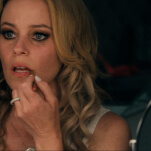In 2014, esthetician-to-the-stars Dawn DaLuise was falsely accused and briefly imprisoned for allegedly ordering a hit on a rival facialist. So, when she saw the trailer for Austin Peters’ Skincare, a film which ostensibly had a plot that mirrored what had happened to her, she was rightfully upset. Elizabeth Banks, the actor portraying DaLuise’s fictional counterpart, Hope Goldman, claims she didn’t even realize that the film was loosely based on real events until well into the process of filming. DaLuise had allegedly been well into the development of turning her ordeal into a film, apparently on the verge of selling a documentary to Netflix. (She claimed back in June that she would be suing for the use of her story without permission). But it’s not surprising why a filmmaker might want to scoop up the salacious, extremely-L.A. tale before someone else got to it first. That said, it’s surprising that this filmmaker scooped it up; it’s been seven years since Peters helmed the Major Lazer concert documentary which doubled as his feature debut. And while Skincare does not outwardly reference Dawn or the real-life crime, it clarifies at the outset that its mediocre esthetician thriller is, indeed, a fictional story based on something that really happened.And it’s very obvious exactly whose story it is. Though all the names have been changed, and the two criminals have been combined into one, the outline of DaLuise’s experience is all on the screen in Peters’ film. DaLuise was stalked, harassed, and defamed. DaLuise blamed a facialist who had homed in on her turf, and who she believed had set out to steal all her business. Peters and team could have turned this news story into a biting commentary on the competition of beauty standards and selling oneself, but instead present a boilerplate thriller with surface-level themes of fame and, well, people’s surface-level.Skincare opens with a morning show interview segment that Hope films with her anchor friend, Brett (Nathan Fillion), in order to promote her first skincare line—made in Italy, she is wont to repeatedly emphasize. But it’s not all success for Hope, as she’s recently struggled to make rent on her storefront despite being in charge of keeping the faces of various, unnamed celebrities youthful. Her financial prospects take an unfortunate turn when she notices that the empty shop across the way now has a new tenant: Angel (Luis Gerardo Méndez), another esthetician, whose unwanted presence threatens to take all of Hope’s business at a critical juncture.Things become even more dire when Hope’s email is hacked, sending out an embarrassing, vulgarity-laden message to over 4,000 recipients. Clients begin backing out, Hope’s interview is pulled from the morning show, and that’s only the beginning of the anonymous campaign of harassment sent her way. She starts receiving cryptic videos and profane text messages. Then, her tires are slashed, and her likeness is plastered onto a Craigslist ad soliciting sexual assault roleplay fantasies. Hope is told to consider what enemies she might have made, and the only name she can think of is Angel, with whom she did not make a favorable first impression. But the stalking coincides with another person who recently entered her life: charismatic “life coach” Jordan (Lewis Pullman, playing the amalgam of real-life stalkers Nicholas Prugo and Edward Feinstein), who worms his way into Hope’s life with the promise of revitalizing her swiftly dwindling brand.It quickly becomes obvious that it’s Jordan who’s behind the torrent of woe, although to what end remains a little unclear. The motives of Prugo and Feinstein are similarly vague, although in both cases it seems likely that it was both a power trip and a sadistic means of entertainment. That the eerie lack of clarity would carry more weight if the rest of Skincare had any meat to it. The 96-minute film is a little too breezy. It’s a plot tailormade for our image-obsessed social media age, in which selling oneself is not just an inescapable part of existing online, but of being alive. Yet Skincare expounds upon few ideas, beyond a scene in which Hope, mid-arrest, attempts to hawk her skincare line to the cops cuffing her wrists.Banks sells the spiraling paranoia of her character—she’s surrounded by men who take advantage of her—but the film she’s in is as blandly blemishless as a newly dermaplaned cheek. It’s also discomfiting that the innocent people Hope drags down with her during her debacle are the only people of color in the film: Angel, her smitten auto mechanic Armen (Erik Palladino), and her assistant Marie (Michaela Jaé Rodriguez), the latter of whom stresses to her boss that she’s put so much time and investment into Hope’s brand that she practically views Hope as a business partner rather than a superior. Another film might have reckoned with the implications of a white woman placing most of her trust in and ultimately being betrayed by both of the white men in the film (Brett and Jordan), while the three non-white characters are the ones who suffer because of it. But that would have needed a better script than the one co-penned by Peters, Sam Freilich, and Deering Regan. The screenplay is too comfortable coasting on dull predictability—equally serviceable camerawork (via cinematographer Christopher Ripley) watching as it dutifully hits the plot points—rather than strengthening its character dynamics or expanding on the interlocking themes of shallowness, self-promotion, and privilege.It’s Lewis Pullman, son of Bill, who leads the film with his performance as the sleazy charm machine Jordan. His sweet, all-too helpful disposition lures vulnerable Hope into putting all her trust in just another friendly white guy. It’s a charismatic showing that nevertheless is stilted by a script unwilling to dig deeper into his manipulations. He ends up being just another element in Skincare’s pick-and-mix of potentially stimulating concepts that are merely half-realized. It’s a film about the costs of selling your own superficiality to the world only ends up just as superficial.Director: Austin PetersWriters: Sam Freilich, Austin Peters, Deering ReganStars: Elizabeth Banks, Lewis Pullman, Luis Gerardo Mendez, Michaela Jae Rodriguez, Nathan FillionRelease Date: August 16, 2024

























